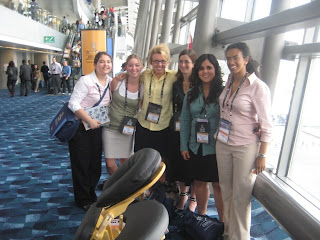 For months we´ve been training and planning for the conference; our training has been thorough and as an historian completely new. It has included the causes of the disease, the ways its transmitted, the effects, how it can destabilize an entire society, the many thousands of children it has orphaned. We are here for those people who are suffering, for those that have lost hope that there will be a solution to their problems, for those that don´t have the money to get their treatments, so that the global community will not forget them and will shift their attention to the type’s of policies necessary to provide an integral response to the disease. A response that look´s at the whole person, at what the disease itself is saying about its transmission and what must be done to stop its further spread.
For months we´ve been training and planning for the conference; our training has been thorough and as an historian completely new. It has included the causes of the disease, the ways its transmitted, the effects, how it can destabilize an entire society, the many thousands of children it has orphaned. We are here for those people who are suffering, for those that have lost hope that there will be a solution to their problems, for those that don´t have the money to get their treatments, so that the global community will not forget them and will shift their attention to the type’s of policies necessary to provide an integral response to the disease. A response that look´s at the whole person, at what the disease itself is saying about its transmission and what must be done to stop its further spread.
There are many issues that need to be covered but to my disappointment the conference, though holding many symposiums and panels with academics that are pointing to solid data, contains a large amount of other panels and symposiums that are focused mainly on the more heated arguments that encumber the discussion of AIDS. They seem to forgot or ignore what those scientist are saying and are focusing exclusively on pushing forward an agenda. Forgetting along the way that what should be under discussion are the ways in which more anti-retrovirals (a treatment that has been proven to slow the disease) can be made accessible to the developing world where problems of lack of resources and medical infrastructure leave many without treatment. The funding that is offered at the conference should go to the increasing access to programmes that have been proven to work instead of further funding methods that have failed, something that becomes obvious when one looks at the HIV prevalence rate in countries where they have been implemented.
Notwithstanding these contradictions we move on and go everyday, we choose certain conferences where the subjects we have written Esperanza’s! for might be of interest to the attendee´s. We hope to get someone there to think something new, of an alternative to what is predominantly being said and manifested at the conference. If we can get one person, one activist, or academic, or minister of health to consider a new approach then we will have achieved something, and some change will become a reality at least in its smallest part.

UPDATE: New York Suicide Bill Moves Forward
Assisted Suicide: The latest in the US What states is...
Read More





